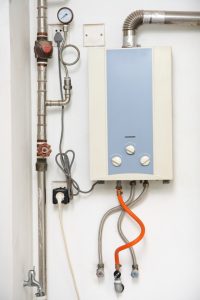Have you been considering an upgrade to a tankless water heater? You may be wondering if it’s really that much better than a water heater. While a tankless water heater, also known as a tankless heater, is a great solution, that doesn’t necessarily mean it is always better than a more traditional tank model. It really comes down to your personal preferences. However, there are several factors that influence the choice between tankless and tank models, such as unit size, fuel type, installation requirements, and overall installation cost.
You can give our team a call to schedule water heater service in Snellville, GA. If you’re not sure about switching, learn more about how much your old water heater might be costing you and compare your options. We can visit at home and talk to you about your various water heater installation options, including both tankless units and tank models. In the meantime, you can keep reading to learn more about the pros and cons of a tankless water heater and how it compares to a more traditional tank water heater.
Introduction to Tankless Water Heaters
Tankless water heaters are a modern solution for providing hot water in your home without the need for a bulky storage tank. Unlike traditional water heaters that keep a large volume of water hot at all times, tankless water heaters heat water only when you need it, a process known as demand hot water delivery. This on-demand water heating process means you get a continuous supply of hot water whenever you turn on the tap, without waiting for a tank to refill. Available in a range of models, tankless water heaters can be powered by electricity, natural gas, or propane, making them a versatile choice for different households. Their compact, energy efficient design not only saves valuable space but also helps reduce energy consumption, making tankless water heaters an increasingly popular option for homeowners looking to upgrade their water heating system. To explain how a tankless water heater work: when you turn on the hot water tap, water flow triggers the heating mechanism, instantly providing hot water as needed.
Types of Tankless Water Heaters
When choosing a tankless water heater, it’s important to understand the different types available. Electric tankless heaters, also known as electric tankless water heater units, are a great fit for smaller homes or apartments, offering straightforward installation and lower upfront costs. For larger households with higher hot water demands, gas tankless water heaters powered by natural gas are often preferred due to their ability to deliver higher flow rates and support multiple hot water fixtures at once; these are also referred to as gas powered units or tankless gas water heater models. If your home doesn’t have access to natural gas, propane tankless water heaters, which are a type of gas tankless water heater, provide a reliable alternative.
When comparing electric units and gas powered units, electric units are generally easier to install and require less infrastructure, but may need electrical upgrades and typically have lower flow rates compared to gas powered units, which require gas lines and ventilation but offer higher performance for larger households.
For those focused on maximizing energy efficiency, condensing tankless water heaters use advanced technology to capture and reuse heat, reducing energy waste and environmental impact. These units use a second heat exchanger to capture additional heat, making them more energy efficient than non-condensing units. Each type of tankless water heater offers unique benefits, so it’s important to consider your home’s size, water usage, and available fuel sources when making a selection.
Comparison to Traditional Tank-Style Water Heaters
Tankless water heaters stand out from traditional tank-style water heaters in several key ways. One of the biggest advantages is energy efficiency, tankless water heaters only heat water when you need it, which can lead to significant energy savings and lower utility bills over time. Their compact size means you won’t have to sacrifice valuable storage space for a bulky tank, making them ideal for homes with limited room. Additionally, tankless water heaters typically have a longer lifespan, often lasting 15-20 years or more with regular maintenance, compared to the 10-12 years you might expect from a tank model. However, it’s important to keep in mind that tankless water heaters usually come with higher upfront costs and may require more complex installation, which can affect your initial investment. The cost for a tankless water heater unit itself makes up about 40% to 45% of the total project cost, so it’s essential to budget accordingly.
Sizing and Selection
Selecting the right tankless water heater for your home is essential to ensure you always have enough hot water for your needs. The key factors to consider are the flow rate how much hot water you’ll need at one time and the temperature rise, which is the difference between your incoming cold water and your desired hot water temperature. The number of bathrooms, appliances, and people in your household all play a role in determining the right size. Climate also matters, as colder incoming water requires more heating power. In cold climates, gas tankless water heaters are often preferred because they perform better at heating colder incoming water compared to electric models. To ensure your tankless water heater is properly sized and installed, it’s best to work with a professional who understands local building codes and safety requirements. This helps guarantee that your new water heater will deliver reliable performance and meet your household’s hot water demands.
Technical Requirements
When installing a tankless water heater, meeting the technical requirements is crucial for both safety and efficiency. First, the tankless water heater should be placed in a location that allows for proper ventilation, especially for gas models, to safely expel exhaust gases and prevent the buildup of harmful fumes. The gas line must be correctly sized to deliver the necessary fuel supply for optimal performance, and any modifications should comply with local building codes. For electric tankless water heaters, the electrical connections must be installed according to the manufacturer’s instructions and local regulations, which may require upgrades to your electrical panel to handle the increased load. The water supply line must be properly connected to ensure a steady flow of water into the unit, and a pressure relief valve should be installed to protect against excessive pressure buildup. It’s also important to verify that the tankless water heater is compatible with your existing water pipes and fittings to avoid leaks or pressure issues. By addressing these technical requirements, you can ensure your tankless water heater operates safely and efficiently for years to come.
Performance Factors
The performance of tankless water heaters depends on several important factors that can influence your overall satisfaction and energy savings. One of the most critical aspects is the flow rate, which determines how much hot water the tankless water heater can deliver at any given time. If your household has multiple hot water fixtures running simultaneously, such as showers and washing machines, you’ll need a tankless water heater with a higher flow rate to maintain continuous hot water. Another key factor is the temperature rise the difference between the incoming cold water temperature and your desired hot water temperature. In colder climates, the tankless water heater will need to work harder to achieve the right temperature, which can affect energy efficiency. Gas tankless water heaters are often chosen for their ability to provide higher flow rates and excellent energy efficiency, making them ideal for larger households. By selecting a tankless water heater that matches your home’s hot water demands and climate, you can enjoy reliable performance and lower utility bills.
Installation Considerations
Installing a tankless water heater involves several important steps to ensure safe and efficient operation. Before removing the old unit, use the drain valve and attach a garden hose to safely drain water from the existing water heater. The unit should be placed in a well-ventilated area, away from flammable materials, and with enough clearance from windows and doors. Gas tankless water heaters require a dedicated gas line and an exhaust vent to safely expel combustion gases, while electric models need an appropriate electrical connection and may require upgrades to your electrical panel. The water supply line must be correctly sized, and a pressure relief valve should be installed to protect against excess pressure. For outdoor installations, weather-resistant enclosures are recommended to shield the unit from the elements. Additionally, the installation of a tankless water heater must comply with local and national codes. You must pull any required permits for installing or replacing a water heater, as this ensures compliance with regulations and avoids potential legal issues. Always follow the manufacturer’s installation manual and consider hiring a professional installer to ensure a safe and compliant installation. Regular maintenance is important for optimal performance and long-term reliability of your tankless water heater. After installation, be sure to purge air from the system to ensure proper water flow and prevent airlocks. Following these steps is essential for the safe operation of your tankless water heater.
Outdoor Installation
For homes with limited indoor space, outdoor installation of a tankless water heater can be an excellent solution. However, it’s important to ensure the tankless water heater is installed in a location that offers adequate protection from rain, wind, and extreme temperatures.
Pros of a Tankless Water Heater
One of the reasons that many homeowners switch to a tankless water heater is because of the nearly endless supply of hot water that it provides. Tankless water heaters deliver continuous hot water and endless hot water as long as there is demand. As long as you have a source of water coming into your home, your tankless water heater can increase the temperature on demand. Additionally, tankless water heaters can improve energy efficiency by up to 34% compared to standard tank models.
When you compare this to a tank water heater with a limited supply of hot water at a given time, it can be a huge benefit. Instead of having to time showers by waiting an hour or two to shower after another person, you can shower back to back and even run your dishwasher, washing machines, and clothes washer back to back using hot water.
Tankless water heaters also take out far less space. If storage is an issue in your home, a tankless model might be beneficial for that reason on its own. Instead of storing a large tank, you have a smaller tankless model installed along a wall.
Another advantage of tankless water heaters is their longer lifespan. Traditional tank water heaters typically last about 10 years, whereas tankless models can last over 20 years with proper maintenance. This durability makes them a solid long-term investment.
Plus, in addition to saving space, you can also save some money on your monthly energy costs. Unlike traditional models, tankless systems operate only when needed. When you turn on a hot water tap or hot water faucet, the water flow sensor detects demand and activates the heating water process. Inside the unit, the heat exchanger rapidly heats the water as it passes through, and in gas models, the gas burner provides instant hot water. Find out why regular water heater flushes are crucial to maintaining efficiency in any system. A tank water heater consumes energy around the clock to maintain a supply of hot water, even when water is not being used. With a tankless unit, energy only gets consumed when there is a demand for hot water. Otherwise, the unit is not active.
Cons of a Tankless Water Heater
Tankless water heaters do have some potential downsides. These systems still require professional maintenance and they’re also more expensive to install than tank water heaters. Tank water heaters are more common and widely used than tankless systems, so the supply is higher. Whereas tankless systems are less common, which makes them more expensive to purchase and install. Draining the old water heater is crucial before installing the new one. Installation requirements, such as upgrading gas lines, gas supply, or electrical upgrades, can significantly increase the installation cost and overall installation costs of a tankless system. When you have a tankless water heater installed, you may benefit from long-term cost savings due to improved energy efficiency, but it’s important to consider the need for professional installation to ensure optimal performance and safety.
Additionally, tankless water heaters may require more complex installation procedures. For instance, gas-powered models might need specific venting systems and gas line modifications, while electric models could necessitate electrical system upgrades to handle the increased load. Before installing a tankless water heater, you should cut off the power and water supply. When switching from a tank to a tankless system, you must remove the existing water heater or old unit and prepare for the new tankless water heater or water heater unit, which may involve additional installation requirements. The overall installation cost for a tankless water heater can range from $1,200 to $3,500, averaging around $2,800. These factors can add to the overall installation time and cost.
You also have to consider that only so much water can move through a tankless model at any given time. If you’ve noticed issues like running out of hot water frequently, a tankless system could still be a viable solution with proper configuration. A tank water heater can push out more water across your home at a given time because the hot water is already in the tank. With a tankless model, two people may not be able to shower on opposite sides of the house without both experiencing lower water pressure.
Installation complexity also means that proper electrical connections and natural gas access are essential for safe and efficient operation, depending on the type of unit you choose. For the best results, professional installation is recommended. Before plugging in the tankless water heater, you must check for leaks in the connections. Additionally, insulating hot water pipes after installation is essential for energy efficiency, as it helps retain heat and reduces energy loss. Hiring experts for installing tankless water heaters ensures all installation requirements are met and the system operates safely.
Your Comfort Is OUR Business. Contact the team at Snellville Heating today to schedule an appointment for the highest quality plumbing services.




